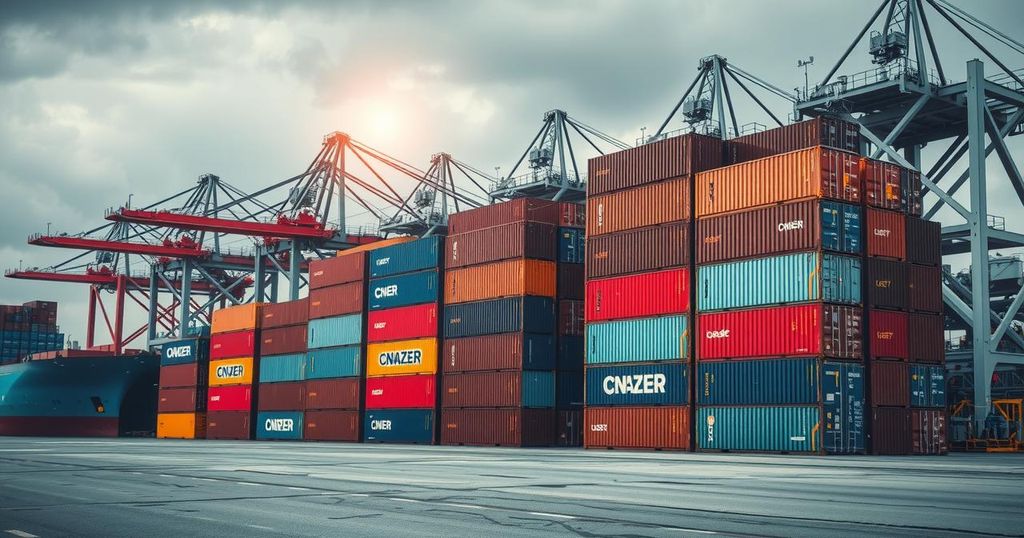Trump Imposes Tariffs on Colombia Amid Migrant Deportation Dispute
U.S. President Donald Trump has imposed a 25% tariff on Colombian imports after President Gustavo Petro denied U.S. military planes access to deported migrants. Trump, citing retaliation, plans to increase tariffs to 50% and implement sanctions against Colombian officials. This conflict highlights tensions around immigration and deportation practices and could lead to increased costs for American consumers.
In a significant escalation of diplomatic tensions, President Donald Trump has announced a 25% tariff on all goods imported from Colombia, following Colombian President Gustavo Petro’s decision to deny entry for U.S. military planes carrying deported migrants. This emergency measure will take effect immediately, with tariffs set to increase to 50% within a week if no resolution is found. Trump emphasized that retaliatory action is necessary due to Colombia’s refusal to comply with legal obligations regarding deportations.
President Petro defended his actions by insisting that deported migrants should be treated with dignity and respect, rejecting the notion of criminalizing them. He stated that Colombia would welcome its citizens on civilian flights rather than military ones. Meanwhile, U.S. officials indicated that the plans for these military flights were scrapped because of diplomatic complications, prompting Trump to announce urgent measures in response.
Trump’s retaliatory measures extend beyond tariffs; he has proposed a travel ban and visa revocations for Colombian officials and their supporters, along with heightened inspections for Colombian nationals at U.S. borders. He criticizes the Colombian government for failing to fulfill its responsibilities concerning the repatriation of migrants, asserting that his administration will not tolerate such violations.
The economic implications of these tariffs could be significant, as Colombia is a major source of U.S. imports, including coffee, bananas, and crude oil. The announced tariffs may lead to increased consumer prices, raising concerns among American consumers. Tensions between the two nations could also hinder collaborative efforts to address migration issues, a key focus for Trump’s foreign policy agenda.
Colombian President Petro revealed that over 15,000 Americans are in Colombia illegally and criticized the tactics of the previous U.S. administration regarding deportation operations. The current rift arises amid Trump’s commitment to stringent immigration policies and mass deportations, emphasizing a stark contrast in approach between his administration and that of President Biden.
Trump’s strategy includes expanding the Immigration and Customs Enforcement’s (ICE) enforcement capabilities as well as reinstating former policies aimed at limiting illegal immigration. Additionally, he aims to send a message of border security through military involvement. The ongoing feud with Colombia will likely complicate U.S. efforts to secure its southern border while maintaining relationships with neighboring countries.
Support from U.S. officials, including Vice President JD Vance and former border officials, highlights a shared sentiment regarding the need for law and order in immigration policies. The backdrop of the Colombian conflict underlines the challenges of an evolving immigration landscape that requires diplomatic finesse, both within the region and beyond.
The context of this situation revolves around increasing tensions between the United States and Colombia regarding migration and deportation policies. The U.S. has a vested interest in cooperating with Colombia to manage migration flows, particularly as many migrants traverse through Colombia to reach the U.S. Furthermore, Colombia’s stance on repatriating migrants contrasts sharply with the previous administration’s stringent immigration policies, influencing diplomatic relations.
In conclusion, President Trump’s imposition of tariffs and sanctions against Colombia marks a significant shift in U.S.-Colombian relations, driven by opposing views on migrant treatment and deportation. The potential economic impact on American consumers, paired with the diplomatic fallout, illustrates the complexities of navigating immigration issues. As both nations grapple with these challenges, the dialogue surrounding immigration policy and international cooperation remains at the forefront.
Original Source: www.bbc.com








Post Comment